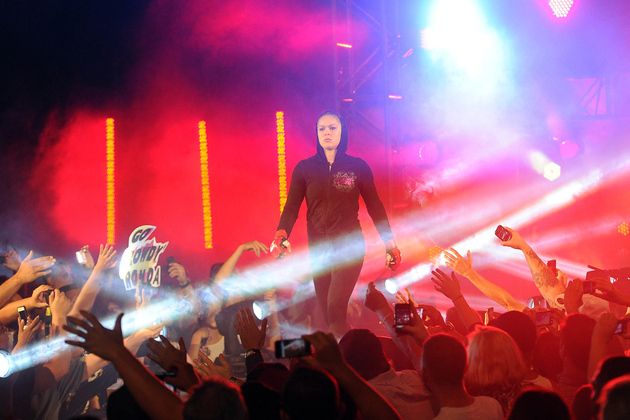
In women’s MMA, there’s only one superfight that can be made: Ronda Rousey vs. Cris Cyborg. Grappling assassin vs. knockout queen. Former Olympian vs. recent drug cheat. It’s a match made in promotional heaven, but it isn’t without its early roadblocks. The two have already publicly sparred over whether a fight should take place at Rousey’s current division of bantamweight, Cyborg’s old stomping grounds at featherweight, or a catch weight number in between.
That’s only one issue that will need to resolved. Another stems from Cyborg’s recent suspension. Manager Darin Harvey has overseen Rousey’s career from before her amateur days, and he says that if a fight between the two is officially proposed, he would request random drug testing to ensure a level playing field. But he’s not talking just about VADA-style testing. On Monday’s edition of The MMA Hour, Harvey said he’d go one step further and request hair follicle testing to ensure that Cyborg hasn’t been using any drugs while on suspension.
Hair follicles capture drug molecules, and testing of the sample is able to detect drugs for up to three months after its original ingestion, according to drug testing experts.
Harvey said he would be willing to pay for the testing to ensure the costs would not dissuade participation.
“I’ll tell you why,” he said. “I believe this is not the first time she used steroids; it’s only the first time she’s been caught.
“I wasn’t surprised,” he continued. “People have speculated but you couldn’t really prove it. Now, it’s been proven. This is my belief. I’m not a doctor but I’ve been around athletes my whole life and I believe that when you take steroids, you alternate your body permanently. Maybe you lose some of the muscle mass, but a lot remains. So she’s permanently altered her body. And I want everything to be to our advantage. She’s been taking male hormones, and it’s not only unethical, it’s freaking dangerous, and you’re endangering the lives of the athletes. She’s coming in there basically with man-like strength or male hormones in her body, and she’s endangering the lives of our athletes.”
Harvey said the decision to request such testing wasn’t a personal one, and that while he’s made very critical comments about Cyborg in the past, that he has heard through mutual acquaintances that she’s a very nice person.
But, he said, he must ensure the fairness of the bout for his client, and for that, he draws a line in the sand.
“I won’t sign the bout agreement unless they agree to random drug testing throughout the camp,” he said. “From the beginning, from the date that the bout agreement is signed, or maybe even before that point, until the day that they fight. And if they don’t agree to that, we wont fight her.”
Harvey acknowledged that these were his personal views alone, which would guide his advisement of Rousey. But if the bantamweight champion decided to forego his recommendation, he would have to go along with her desires.
As far as the weight debate, Harvey reiterated that Rousey would only take the fight at 135 pounds. On that though, he did leave some wiggle room, saying that if the bout ended up on pay-per-view and/or brought with it a financial windfall, there might be some room for persuasion.
“She’s going to have to figure out a way to make the weight,” he said. “And I believe she can make the weight.”
Harvey doesn’t expect Rousey to fight for a few months. His projected return date was somewhere around January, which coincidentally would be around the time Cyborg was free to fight again. But given Rousey’s rising star, other offers are coming her way. They’ll listen to the pitches, but Harvey doesn’t think MMA fans will have to worry about losing Rousey to Hollywood anytime soon.
“We’re exploring every possible avenue anyway we can monetize it,” he said. “If Ronda likes [something], that’s what we’d consider. But she likes to fight. She’s not a mean person but she’s a mean fighter.”